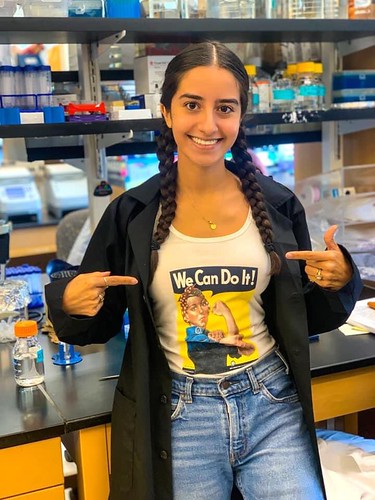
By Lauren Hines | Bond LSC
Sara Ricardez Hernandez starts her day in the Chris Lorson lab with a vibrant demeanor while wearing her jet-black lab coat. Within five minutes, the graduate student is already at her microscope.
Ricardez Hernandez’s eagerness has only enhanced since she and principal investigator Chris Lorson won the Howard Hughes Medical Institute (HHMI) Gilliam Fellowship on July 22. HHMI created the Gilliam Fellowship and its three-year funding to award and advance diverse and inclusive environments in science.
For Ricardez Hernandez, fostering a healthy, diverse lab environment hits home. Being from Mexico and president of the Society for Advancement of Chicanos/Hispanics and Native Americans in Science (SACNAS) chapter at MU, she knows minority students are often left out of the research career conversation and need opportunities to connect to research.
“I went to [University of Missouri-St. Louis], and I was the only Latina in my whole class,” Ricardez Hernandez said. “I also didn’t really have any mentors that looked like me. I was very interested in showing other people from the same background that they can also be scientists.”
Ricardez Hernandez found out about the fellowship in the middle of an online conference.
“I was super excited,” Ricardez Hernandez said. “I was like, ‘Oh my god!’ And then I went home, and I celebrated it with my fiancé.”
The $50,000 per year will be used to better understand disease and therapeutic developments for the infantile disease spinal muscular atrophy with respiratory distress type 1 (SMARD1). The genetic disorder occurs in children with mutations in the Immunoglobulin-μ-DNA Binding Protein 2 (Ighmbp2) gene.
The Lorson lab looks at SMARD1 in mice to better understand the disease and do preclinical testing of treatments, which fills much of Ricardez Hernandez’s day in the lab.
This involves doing anything from perfusing and dissecting mice tissue to staining mice diaphragms to see if there’s a disruption between the muscle and the muscle nerve cells. Often, Ricardez Hernandez visits the mouse room.
“That’s my favorite part of the day because I love mice,” Ricardez Hernandez said. “They’re so cute. We study an infantile disease, so we mostly use baby mice. These mice can die very prematurely, so if we treat them, they can be rescued.”
Lorson is frequently in and out of the lab helping lab members with their experiments. Lorson has been an important mentor and support system for Ricardez Hernandez even before she joined the lab in 2020.
“It was my first semester of my Ph.D., and I really wanted to go to the [SACNAS] national conference,” Ricardez Hernandez said. “We needed some funding, and [Lorson] being in the veterinary school was like, ‘Oh, I heard that you’re looking for funding. I know someone who can help you with that,’ and it was himself.”
Lorson’s mentorship may have rubbed off on Ricardez Hernandez a little since it’s now a passion in her daily life. Usually, she’ll work with undergraduates in the lab and meet with her mentees from the Maximizing Access to Research Careers/Initiative for Maximizing Student Diversity (MARC/IMSD) program after work. Then, she’ll help students as a teacher’s assistant for a microbiology class.
“She’s honestly an inspiration for any minorities seeking medicine, research, or higher education,” said Zayd Al Rawi, an undergraduate in the Lorson lab. “Although I come from a different background, being Middle Eastern, we share the commonality of being minorities in America, so I see her as a role model. She’s a true inspiration to minorities seeking their goals.”
The Gilliam Fellowship will help Ricardez Hernandez advance her research and gain her Ph.D. in molecular pathogenesis and therapeutics. Until then, Ricardez Hernandez will spend her afternoons helping students and quantifying data with her favorite show on in the background.
“Overall, [she’s] one of the best people, best researchers, and one of the best supportive mentors that I’ve met,” Al Rawi said. “I’m really glad that I’m in this lab and I’ve crossed paths with her. I know she’s going to continue doing great things in the future.”
More information on the HHMI Gilliam Fellowship can be found here, and information on the Mizzou SACNAS chapter can be found on their website.

